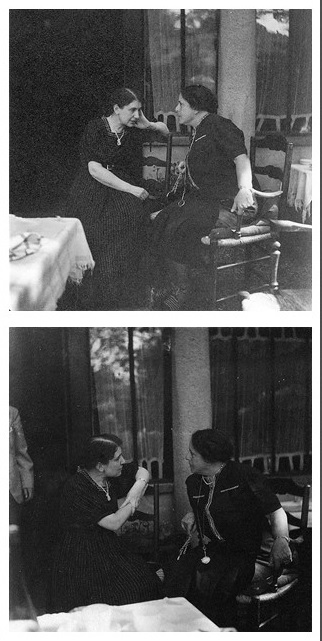Olga Umansky, MLIS, is a librarian and archivist of the Hanns Sachs Library at BPSI. Her remarks below originally appeared in the Winter 2021 issue of the library newsletter, which can be read here.

Anna Borgos, Research Fellow at the Institute of Cognitive Neuroscience and Psychology, Hungarian Academy of Sciences, requested BPSI archival photos of Anna Freud talking to Vilma Kovács at the 1938 IPA Congress in Paris for her book Women in the Budapest School of Psychoanalysis: Girls of Tomorrow (forthcoming from Routledge in July 2021). She helped us to identify previously unknown women in other Congress pictures, also correcting some misidentified photos of Vilma Kovács and her daughter Alice Balint. In her article Women in the History of Hungarian Psychoanalysis, Anna Borgos notes that women comprised 30% of the Hungarian Psychoanalytic Association in 1929, – a significant increase from 5% in the previous decade on the way to reach 48% ratio by 1937. Women analysts of that era became instrumental in the shift of focus from the father to the mother and “were more inclined to explore… women’s social roles, sexuality, and motherhood and to rethink the concepts of masculinity and femininity.” Borgos emphasizes the roles of Hungarian female scholars in several new fields, such as the study of schizophrenia (Lilly Hajdu), ethno-psychology (Alice Balint), or the formation of the system of the training analysis (Vilma Kovács).” (Borgos, p. 160).
Vilma Kovács (1879-1940) was a close collaborator of Sándor Ferenczi, whom she met at the end of WWI as a patient suffering from agoraphobia. She quickly became his star trainee and had her own practice by 1920. Born in the south of Hungary to a Jewish trader’s family, Vilma got married at the age of 15 against her will and had three children by the age of 18. (Her first child Alice Szekely-Kovács became known under the last name of her husband, Michael Balint). As many others in her time, she contracted tuberculosis and was sent to a sanatorium, where she met an architect, Frigyes Kovács, who eventually became her second husband. The couple provided significant financial support to the Hungarian Psychoanalytic Society and, in 1931, opened the Hungarian Polyclinic for the financially struggling patients in one of the buildings they owned. Vilma made a great impact on the Hungarian school of psychoanalysis, training and supervising many students, including a circle of young women, such as Lilly Hajdu, Erzsébet Kardos, Alice Hermann, and Alice Balint. She published five papers, taught technical seminars and organized, with Ferenczi, what is known to this day as “a Hungarian training method,” the system in which a trainee’s first cases are supervised by a training analyst (Training-and-Control Analysis, 1936). In the midst of political tensions of 1938, she and her husband decided to move to Paris, but then returned to Budapest where Vilma died in 1940, surviving her oldest daughter by one year (a 41-year old Alice Balint unexpectedly died of ruptured aneurism in Manchester, in 1939).
References:
- Borgos, A. (2017). Women in the History of Hungarian Psychoanalysis. European Yearbook of the History of Psychology, 3: 155-180.
- Dupont, J. Kovács-Prosznitz, Vilma (1879-1940). International Dictionary of Psychoanalysis.
- Women Psychoanalysts in Hungary. Psychoanalytikerinnen. Biograisches Lexikon.
Olga Umansky can be contacted by email here.
***
The opinions or views expressed on the Boston Psychoanalytic Society & Institute (“BPSI”) social media platforms, including, but not limited to, blogs, Facebook posts and Twitter posts, represent the thoughts of individual contributors and are not necessarily those of the Boston Psychoanalytic Society & Institute or any of its directors, officers, employees, staff, board of directors, or members. All posts on BPSI social media platforms are for informational purposes only and should not be regarded as professional advice.
BPSI does not control or guarantee the accuracy, relevance, timeliness or completeness of information contained in its contributors’ posts and/or blog entries, or found by following any linked websites. BPSI will not be liable for any damages from the display or use of information posted on its website or social media platforms. BPSI cannot and does not authorize the use of copyrighted materials contained in linked websites.

